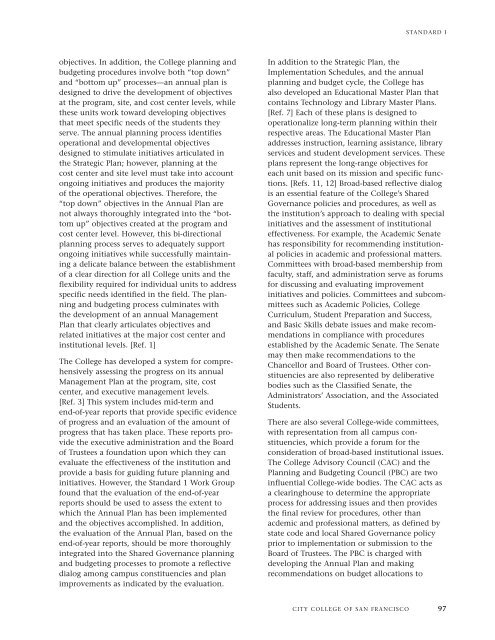City College of San Francisco - California Competes
City College of San Francisco - California Competes
City College of San Francisco - California Competes
You also want an ePaper? Increase the reach of your titles
YUMPU automatically turns print PDFs into web optimized ePapers that Google loves.
STANDARD I<br />
objectives. In addition, the <strong>College</strong> planning and<br />
budgeting procedures involve both “top down”<br />
and “bottom up” processes—an annual plan is<br />
designed to drive the development <strong>of</strong> objectives<br />
at the program, site, and cost center levels, while<br />
these units work toward developing objectives<br />
that meet specific needs <strong>of</strong> the students they<br />
serve. The annual planning process identifies<br />
operational and developmental objectives<br />
designed to stimulate initiatives articulated in<br />
the Strategic Plan; however, planning at the<br />
cost center and site level must take into account<br />
ongoing initiatives and produces the majority<br />
<strong>of</strong> the operational objectives. Therefore, the<br />
“top down” objectives in the Annual Plan are<br />
not always thoroughly integrated into the “bottom<br />
up” objectives created at the program and<br />
cost center level. However, this bi-directional<br />
planning process serves to adequately support<br />
ongoing initiatives while successfully maintaining<br />
a delicate balance between the establishment<br />
<strong>of</strong> a clear direction for all <strong>College</strong> units and the<br />
flexibility required for individual units to address<br />
specific needs identified in the field. The planning<br />
and budgeting process culminates with<br />
the development <strong>of</strong> an annual Management<br />
Plan that clearly articulates objectives and<br />
related initiatives at the major cost center and<br />
institutional levels. [Ref. 1]<br />
The <strong>College</strong> has developed a system for comprehensively<br />
assessing the progress on its annual<br />
Management Plan at the program, site, cost<br />
center, and executive management levels.<br />
[Ref. 3] This system includes mid-term and<br />
end-<strong>of</strong>-year reports that provide specific evidence<br />
<strong>of</strong> progress and an evaluation <strong>of</strong> the amount <strong>of</strong><br />
progress that has taken place. These reports provide<br />
the executive administration and the Board<br />
<strong>of</strong> Trustees a foundation upon which they can<br />
evaluate the effectiveness <strong>of</strong> the institution and<br />
provide a basis for guiding future planning and<br />
initiatives. However, the Standard 1 Work Group<br />
found that the evaluation <strong>of</strong> the end-<strong>of</strong>-year<br />
reports should be used to assess the extent to<br />
which the Annual Plan has been implemented<br />
and the objectives accomplished. In addition,<br />
the evaluation <strong>of</strong> the Annual Plan, based on the<br />
end-<strong>of</strong>-year reports, should be more thoroughly<br />
integrated into the Shared Governance planning<br />
and budgeting processes to promote a reflective<br />
dialog among campus constituencies and plan<br />
improvements as indicated by the evaluation.<br />
In addition to the Strategic Plan, the<br />
Implementation Schedules, and the annual<br />
planning and budget cycle, the <strong>College</strong> has<br />
also developed an Educational Master Plan that<br />
contains Technology and Library Master Plans.<br />
[Ref. 7] Each <strong>of</strong> these plans is designed to<br />
operationalize long-term planning within their<br />
respective areas. The Educational Master Plan<br />
addresses instruction, learning assistance, library<br />
services and student development services. These<br />
plans represent the long-range objectives for<br />
each unit based on its mission and specific functions.<br />
[Refs. 11, 12] Broad-based reflective dialog<br />
is an essential feature <strong>of</strong> the <strong>College</strong>’s Shared<br />
Governance policies and procedures, as well as<br />
the institution’s approach to dealing with special<br />
initiatives and the assessment <strong>of</strong> institutional<br />
effectiveness. For example, the Academic Senate<br />
has responsibility for recommending institutional<br />
policies in academic and pr<strong>of</strong>essional matters.<br />
Committees with broad-based membership from<br />
faculty, staff, and administration serve as forums<br />
for discussing and evaluating improvement<br />
initiatives and policies. Committees and subcommittees<br />
such as Academic Policies, <strong>College</strong><br />
Curriculum, Student Preparation and Success,<br />
and Basic Skills debate issues and make recommendations<br />
in compliance with procedures<br />
established by the Academic Senate. The Senate<br />
may then make recommendations to the<br />
Chancellor and Board <strong>of</strong> Trustees. Other constituencies<br />
are also represented by deliberative<br />
bodies such as the Classified Senate, the<br />
Administrators’ Association, and the Associated<br />
Students.<br />
There are also several <strong>College</strong>-wide committees,<br />
with representation from all campus constituencies,<br />
which provide a forum for the<br />
consideration <strong>of</strong> broad-based institutional issues.<br />
The <strong>College</strong> Advisory Council (CAC) and the<br />
Planning and Budgeting Council (PBC) are two<br />
influential <strong>College</strong>-wide bodies. The CAC acts as<br />
a clearinghouse to determine the appropriate<br />
process for addressing issues and then provides<br />
the final review for procedures, other than<br />
acdemic and pr<strong>of</strong>essional matters, as defined by<br />
state code and local Shared Governance policy<br />
prior to implementation or submission to the<br />
Board <strong>of</strong> Trustees. The PBC is charged with<br />
developing the Annual Plan and making<br />
recommendations on budget allocations to<br />
CITY COLLEGE OF SAN FRANCISCO<br />
97







